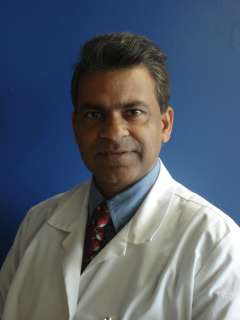
Ram Raj Singh, MD
Specialty
Institutional Affiliation
Languages
Education
Fellowships
Internship
Degree
Residencies
Board Certifications
Contact Information
Phone
Clinical Interests
Scientific Interests
A major research focus in Dr. Ram Raj Singh's laboratory is the understanding of the mechanisms of dendritic cell migration, the investigation of dendritic cellÐgamma delta T-cell interactions and the exploration of how dendritic cell migration can be modulated to enhance the efficacy of vaccination and to suppress autoimmune inflammation using models of lupus dermatitis.
Another major aim of Singh's laboratory, in collaboration with Arthur Arnold (Physiology) and Rhonda Voskuhl (Neurology), is to understand mechanisms of gender bias in immune and autoimmune response and autoimmune diseases. In particular, Singh and his team are interested in understanding the role of sex chromosome complements in altering immune regulation and inducing autoimmune diseases such as lupus.
Additional research projects involve investigating the homeostatic regulation of marginal zone B-cells by invariant natural killer T-cells, the role of natural killer T-cells in autoreactive T- and B-cell activation and autoimmune disease, mechanisms of T-cell anergy and activation in autoreactive T-cells, biomarkers of autoimmune diseases in lung, kidney and skin disease and the role of mesenchymal stem cells in causing immune aberrations in autoimmune disease models.
Highlighted Publications
Eriksson AU, Singh RR. Cutting edge: migration of langerhans dendritic cells is impaired in autoimmune dermatitis. J Immunol. 2008 Dec 1;181(11):7468-72.
Smith-Bouvier DL, Divekar AA, Sasidhar M, Du S, Tiwari-Woodruff SK, King JK, Arnold AP, Singh RR, Voskuhl RR. A role for sex chromosome complement in the female bias in autoimmune disease. J Exp Med. 2008 May 12;205(5):1099-108. Epub 2008 Apr 28.
Saxena V, Lienesch DW, Zhou M, Bommireddy R, Azhar M, Doetschman T, Singh RR. Dual roles of immunoregulatory cytokine TGF-beta in the pathogenesis of autoimmunity-mediated organ damage. J Immunol. 2008 Feb 1;180(3):1903-12.
Yang J-Q, Wen X, Liu H, Folayan G, Dong X, Zhou M, Van Kaer L, Singh RR. Examining the role of CD1d and natural killer T cells in the development of nephritis in a genetically susceptible lupus model. Arthritis Rheum. 2007 Apr;56(4):1219-33.
Yang JQ, Saxena V, Xu H, Van Kaer L, Wang CR, Singh RR. Repeated alpha-galactosylceramide administration results in expansion of NK T cells and alleviates inflammatory dermatitis in MRL-lpr/lpr mice. J Immunol. 2003; 171(8): 4439-46.